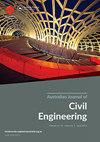Feasibility Study of Reusing Wash Water and Steel Fibre Simultaneously on Workability, Mechanical Properties and Fracture Toughness of Concrete
IF 1.6
Q3 ENGINEERING, CIVIL
引用次数: 6
Abstract
ABSTRACT Water scarcity is the world’s challenging issue, and every day huge amounts of wash water(W) are produced by the concrete batching plants and concrete mixer trucks. Therefore, wash water reuse can be a method of saving water. This experimental work was conducted to determine the feasibility of using wash water in normal concrete and fibre(F) reinforced concrete. Workability and compressive, tensile, and flexural strengths, as well as fracture toughness of concrete specimens, were carried out according to ASTM and BS. The slump test results showed a slight decrease while using wash water or steel fibre and using both of them concurrently. Using wash water instead of tap water increased compressive strength at 7,14 and 28 days. Adding steel fibre in the specimens containing tap water raised compressive strength sharply at all periods. Nevertheless, applying wash water and steel fibre instantaneously in the concrete sample decreased compressive strength. This consequence was confirmed by the SEM image. Both tensile and flexural strength increased while using wash water instead of tap water. The maximum tensile strength was observed when 100% wash water and steel fibre (W + F) were replaced by tap water. Using steel fibre for concrete samples using tap water increased flexural strength by around 14% compared to the control sample. The highest flexural strength was reached while 100% wash water and steel fibre (W + F) were used simultaneously. Substituting wash water with tap water increased fracture toughness, and adding steel fibre to the concrete sample applying tap water similarly raised fracture toughness compared to the control sample. While using wash water and steel fibre in the concrete sample instantaneously, the fracture toughness increased by 49%.水洗水和钢纤维同时回用对混凝土和易性、力学性能和断裂韧性的可行性研究
摘要水资源短缺是世界上最具挑战性的问题,混凝土搅拌站和混凝土搅拌车每天都会产生大量的冲洗水。因此,冲洗水回用可以成为一种节水的方法。本试验工作旨在确定在普通混凝土和纤维(F)钢筋混凝土中使用冲洗水的可行性。根据ASTM和BS对混凝土试样的工作性、抗压、抗拉和弯曲强度以及断裂韧性进行了测试。坍落度测试结果显示,使用洗涤水或钢纤维并同时使用两者时,坍落度略有下降。使用洗涤水代替自来水在第7、14和28天增加了抗压强度。在含有自来水的试样中加入钢纤维,在所有时期都能显著提高抗压强度。然而,在混凝土样品中立即加入洗涤水和钢纤维会降低抗压强度。SEM图像证实了这一结果。当使用洗涤水代替自来水时,拉伸强度和弯曲强度都增加了。当用自来水代替100%洗涤水和钢纤维(W+F)时,观察到最大拉伸强度。在使用自来水的混凝土样品中使用钢纤维,与对照样品相比,弯曲强度提高了约14%。当同时使用100%的洗涤水和钢纤维(W+F)时,达到了最高的弯曲强度。与对照样品相比,用自来水代替洗涤水提高了断裂韧性,并在使用自来水的混凝土样品中添加钢纤维同样提高了断裂韧度。当在混凝土样品中瞬时加入洗涤水和钢纤维时,断裂韧性提高了49%。
本文章由计算机程序翻译,如有差异,请以英文原文为准。
求助全文
约1分钟内获得全文
求助全文

 求助内容:
求助内容: 应助结果提醒方式:
应助结果提醒方式:


